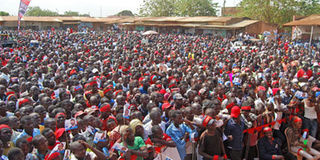Is it service delivery to voters or MPs?

What you need to know:
Sunday Monitor of January 12, carried a story that one needs about Shs500m to run for Member of Parliament election. It was reported that it makes business sense as during the five-year term the elected MP takes home Shs1.8b.
Sunday Monitor of January 12, carried a story that one needs about Shs500m to run for Member of Parliament election. It was reported that it makes business sense as during the five-year term the elected MP takes home Shs1.8b.
Two things came into my mind; why should a poor country like Uganda spend so much money on politics? What calibre of politicians do we get in Parliament?
Credit Suisse, a research institute, publishes Global Wealth Data book annually. Apart from common Gross Domestic Product (GDP) per capita, one is able to see how countries vary in terms of wealth of their citizens.
It provides median wealth per adult. For example, in 2016, Uganda’s per capita was $580.38 (about Shs2.13m) this includes children, while median wealth per adult was $161 (about Shs592,514 ) this is the wealth 50 per cent of what adults own. For comparison, it was $126 (Shs463,718) and$188,088 ( Shs693m) for Burundi and Iceland respectively in the same year.
In 2016, Canada had a population of 35,151,728 and of these 27,995,000 were adults compared to Uganda’s of 41,490,000 where 16,585,000 are adults (we have more children than adults). Canada’s median wealth per adult was $96,664 (Shs356m). The country had 443 MPs (338 MPs elected by voters and 105 appointed senators) and had GDP of $ 1,536b (ranked 10th in the world).
Uganda’s GDP was $ 24b. A Canadian MP in 2015/2016 earned total salary of $167,400 while the Ugandan MP took home about $100,000.
In other words, the government of Uganda adds to every MP $500,000 to provide services to their constituents. What do voters get? After five years does their median wealth double? Do the voters get better healthcare and does education for their children improve tremendously? Where is the priority of the government – MPs or voters?
In the recently released Primary Leaving Examinations (PLE) results, Amudat District had two students in Division One of its 301 candidates.
According to population census of 2014, Amudat (with two MPs) had a population of 105,769 people of which 69,024 were aged zero to 19 years (average increase of 3,632 children per year). This implies that about 3,000 students who should have sat for PLE did not. Assuming on average,1,000 children are in each primary school year, then capitation grant for primary schools in Amudat District total is about Shs60m to Shs70m. The same money is paid to its two MPs in one month. And why are children not in school? Why is their performance in exams horrible?
Amudat District adults (about 35,000) have total wealth of about Shs20b (at $ 161 or Shs592,514 median wealth per adult). By the government paying Shs3.8b to the two MPs in five years, residents only benefit through having their two MPs and little in terms of service delivery.
The most important question is even about the priorities of elected MPs. Isn’t it recovery of their spent money? And can a very competent Ugandan citizen who does not have that money or doesn’t take risk ever join Parliament? If we only get courageous business people in Parliament, how shall we face complex challenges of the 21st Century?
Balla Turyahumura




